Being inspired by Cousteaus: An evening with Jean-Michel Cousteau
Bill Dennison ·I attended "The Great Ocean Adventure: An evening with Jean-Michel Cousteau" event at the Institute of Marine and Environmental Technology (IMET) in Baltimore's inner harbor on 9 October 2013. The event included dinner with fish that were raised in the Aquaculture Research Center, a facility pioneered by Yoni Zohar, which is developing sustainable aquaculture approaches using recirculating aquaculture facility in the ground level of IMET.
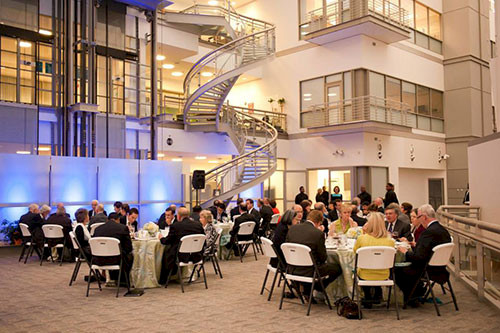
IMET is a novel facility, shared by three different universities; University of Maryland Center for Environmental Science (UMCES), University of Maryland, Baltimore County (UMBC) and University of Maryland, Baltimore (UMB). The IMET director, Russell Hill, was the Master of Ceremonies, and all three university presidents were present; Don Boesch (UMCES), Freeman Hrabowski III (UMBC), Jay Perman (UMB), as well as the university System of Maryland Chancellor, Brit Kirwin.
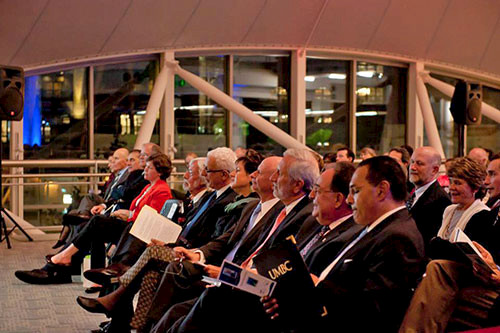
The guest speaker was Jean-Michel Cousteau, son of the famed ocean explorer Jacques-Yves Cousteau (1910-1997). Jean-Michel interspersed his talk with a series of short video clips. Jean-Michel recounted conversations with his father: "My father used to say 'People protect what they love' and I would ask 'How can you protect what you don't understand?'" Jean-Michel added that "We need to protect ourselves, and to protect ourselves, we need to protect this environment which we all depend upon".
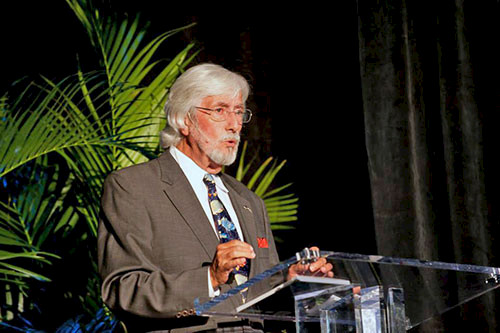
Jean-Michel spoke often about his father and I reflected on what his father meant to me.
Ker Than wrote a nice article in National Geographic Daily News "Jacques Cousteau Centennial: What he did, why he matters" in which he identified five major accomplishments of Jacques Cousteau:
- Pioneered scuba gear.
- Underwater documentaries brought a new world to viewers.
- Pioneered underwater base camps.
- Helped restrict commercial whaling.
- Helped stop underwater dumping of nuclear waste.
In reflecting on my career, I realize that Jacques-Yves Cousteau provided inspiration throughout. 1) Scuba gear: I used scuba gear extensively in my research on marine plants. In fact, during my PhD research on seagrasses in Woods Hole, MA, I used an old fashioned double hose regulator, Mistral, developed by Cousteau and Gagnan. 2) Underwater documentaries: The Cousteau shows that appeared on National Geographic on Sunday evenings were my favorite television shows. I grew up in Ohio, a thousand miles from the ocean, but Cousteau's documentaries aboard the Calypso transported me to exotic underwater locations around the world. After Jean-Michel's talk, several of us were sounding out the National Geographic theme music from memory. 3) Underwater habitats: The stories of the Cousteau crew living underwater in various locations (Conshelf I, II and III) were an inspiration for the Hydrolab mission that I undertook in St. Croix in 1984 with my aquanaut colleagues Susan Williams, Bruce Nyden and Chuck Gross to study circadian rhythms in marine plants. 4) Commercial whaling: Cousteau's call for restricting commercial whaling resonated with me and I also recall that during my Master's research (1978-79) at the University of Alaska, Cousteau came out with a statement that commercial fishing was as big a threat to the ocean as offshore oil development. At the time, this was a courageous statement and the succession of fishing collapses and increase in marine protected areas have borne out Cousteau's warning. 5) Nuclear waste: Fortunately, ocean dumping of nuclear waste apart from the unfortunate Japanese tsunami impacts, is not currently a major issue. However, much of my career is focused on the runoff of nutrients, sediments and toxicants from land into the ocean, another form of ocean dumping. So clearly, Jacques-Yves Cousteau inspired my career in a variety of ways.
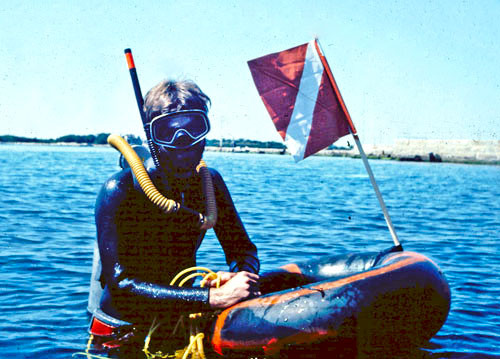
I first met Jean-Michel Cousteau in 1994 when he was a guest speaker at a scuba diving conference at the Heron Island resort on the Great Barrier Reef. I was based at the Heron Island Research Station, University of Queensland and went over to the resort to hear Jean-Michel. I had sailed with one of his former colleagues, the late Henry Genthe, aboard the R/V Westward, Sea Education Association and we compared notes on what Henry had gotten up to. Jean-Michel challenged the divers at the resort to amend their diving practices to become more environmentally friendly, which I thought was a courageous speech to give to that particular audience.
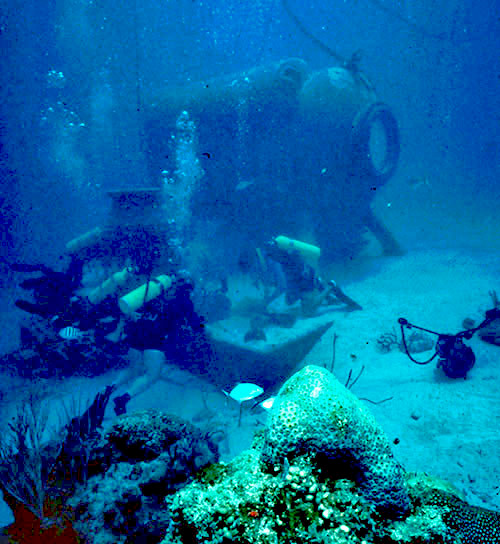
Given this history of the Cousteau's calling for better environmental stewardship and not being afraid to directly address those responsible, I asked Jean-Michel what we environmental scientists should do. His response was music to my Integration and Application Network ears. Jean-Michel said that we needed to more effectively communicate our knowledge to the broader public and to decision-makers. He once again emphasized his conversation with his father about protecting what you love and understand.
One of the legacies of Jacques-Yves Cousteau is his progeny of well spoken environmental activists. In addition to Jean-Michel, President of Ocean Futures Society, Jean-Michel's son Fabien and daughter Celine are active in marine conservation. Both the son (Phillipe Jr.) and daughter (Alexandra) of Phillipe Cousteau, Jean-Michel's brother, and Francine and Pierre-Yves Cousteau, the widow and son of Jacques-Yves Cousteau's second marriage, are active in marine conservation as well. In addition to these various Cousteaus, there are many marine scientists and marine conservationists like myself who are part of this legacy of Jacques-Yves Cousteau.
About the author
Bill Dennison

Dr. Bill Dennison is a Professor of Marine Science and Interim President at the University of Maryland Center for Environmental Science (UMCES).
Next Post > John Bertram's legacy
Comments
-
Atika 7 months ago
Thank you for sharing this great information with us, i really appreciate your post!